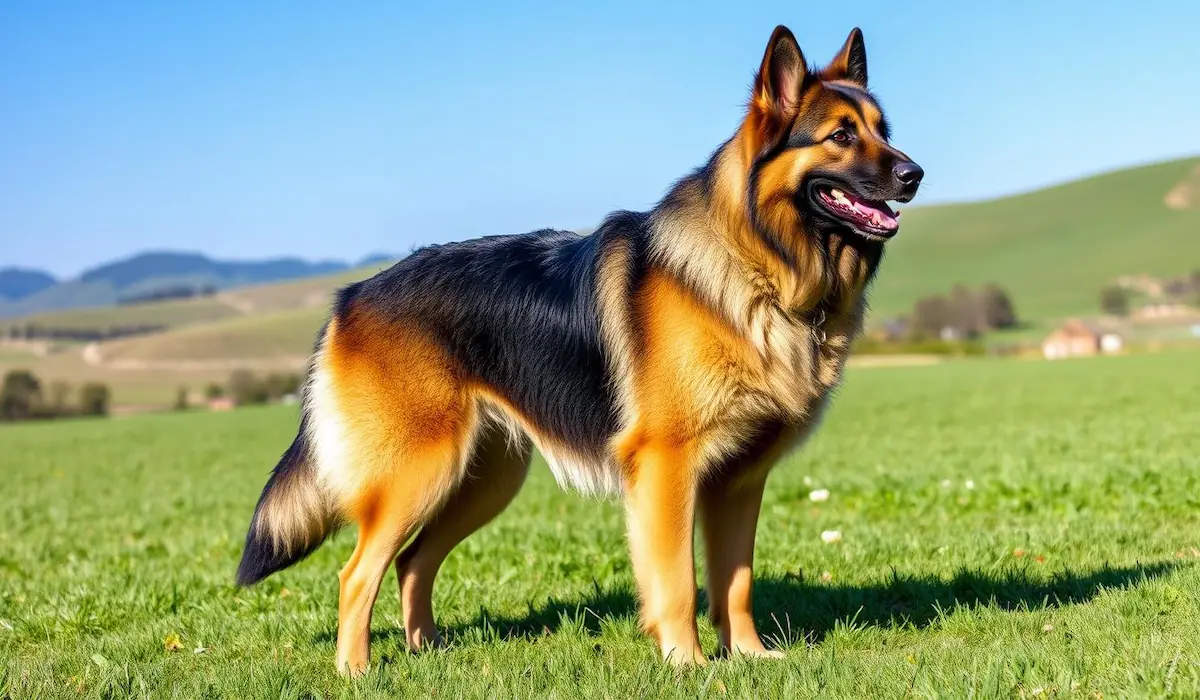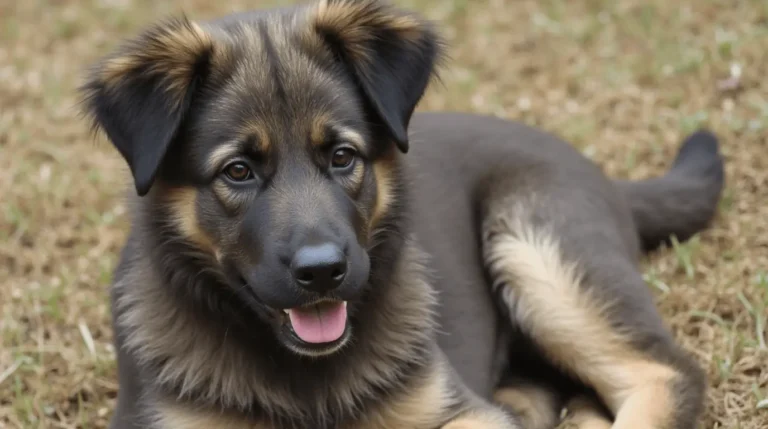King Shepherds: The Ultimate Guide to Their Care, Training, and Health
As a proud parent of a King Shepherd, I’ve grown to love their unique nature. These dogs are not just beautiful; they are also loyal and intelligent. If you’re thinking about getting a King Shepherd, this guide will help you understand them better.
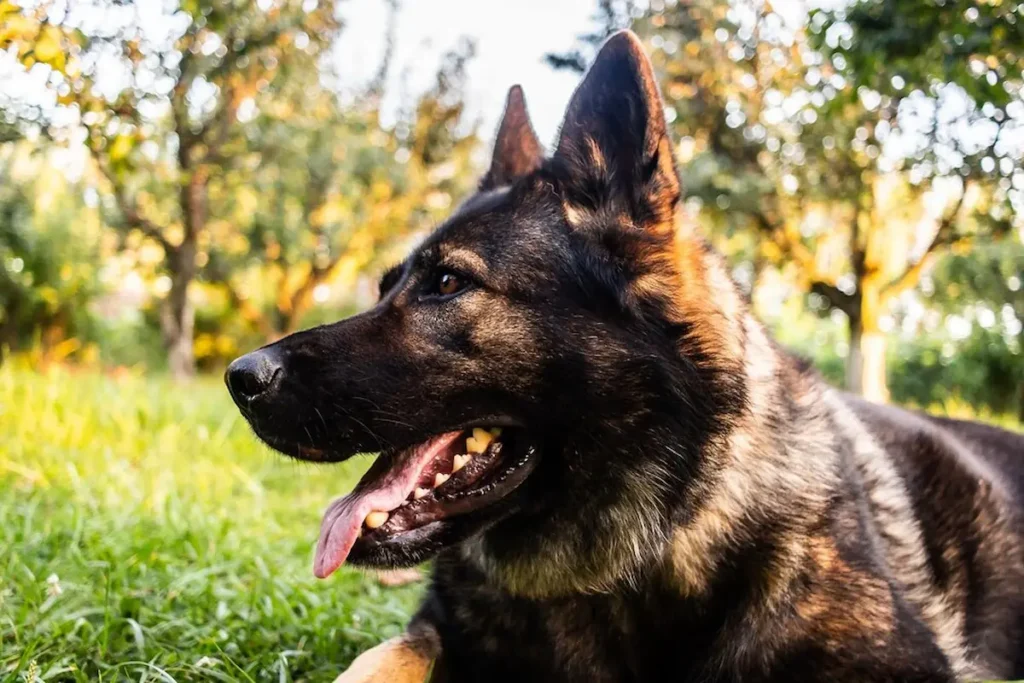
“A majestic King Shepherd standing proud in a lush green field, showcasing its strong build and dense coat, with a backdrop of rolling hills under a clear blue sky, emphasizing its noble appearance and alert expression.”
Key Takeaways
- King Shepherds are a large breed dog, standing 25-31 inches tall and weighing 70-150 pounds.
- They are a mix of German Shepherd and other breeds like Alaskan Malamute, Great Pyrenees, and Akita.
- Known for their loyalty, intelligence, and easy trainability, King Shepherds make excellent companions.
- King Shepherds come in a variety of colors, including sable, black and tan, cream, silver, solid black, and solid white.
- With a lifespan of 10-14 years, proper care, exercise, and nutrition are essential for their well-being.
Understanding the King Shepherd Breed
The King Shepherd is a new dog breed that has become popular lately. It was created in the 1990s in the United States. This breed is a mix of German Shepherd, Shiloh Shepherd, and sometimes Alaskan Malamute or Great Pyrenees. This mix makes King Shepherds bigger and stronger.
Origin and Development
The King Shepherd was made to fix the health problems of the German Shepherd. Breeders added Shiloh Shepherd, Alaskan Malamute, and Great Pyrenees genes. They wanted a dog that’s healthier and less likely to get hip or elbow problems.
Related: Essential Guide to Service Dog Training: Steps for Success
Physical Characteristics and Size
King Shepherds are much bigger than German Shepherds. Males are 29-31 inches tall and weigh 130-150 pounds. Females are 27-29 inches tall and weigh 90-110 pounds. They have a thick double coat that can be straight or slightly wavy. They come in many colors like sable, bi-colored, black, red, tan, or cream.
Breed Recognition Status
The American Rare Breed Association (ARBA) recognizes the King Shepherd breed. But, major kennel clubs like the American Kennel Club (AKC) or the United Kennel Club (UKC) don’t. This means King Shepherds can’t compete in all dog shows. They don’t have an official breed standard yet.
| Characteristic | King Shepherd | German Shepherd |
|---|---|---|
| Height (Male) | 29-31 inches | 22-26 inches |
| Height (Female) | 27-29 inches | 21-24 inches |
| Weight (Male) | 130-150 pounds | 48-90 pounds |
| Weight (Female) | 90-110 pounds | 48-70 pounds |
| Lifespan | 10-11 years | 7-13 years |
The King Shepherd is known for its size, unique look, and special genes. As the breed grows, owners should think about its needs and care.
Temperament and Personality Traits
The King Shepherd is known for being loyal, loving, and smart. They are easy to train and get along well with people and pets. They are calm and patient, making them great with kids.
These dogs are very adaptable and can be many things, like loyal friends or therapy dogs. They protect their families but do it in a gentle way. This keeps the home peaceful.
King Shepherds love to learn and enjoy new things. With patience and training, they grow up to be well-behaved and friendly. It’s important to socialize them well so they get along with others.
“King Shepherds are the perfect blend of loyalty, intelligence, and affection, making them beloved family members and versatile companions.”
Even though they are big and full of energy, they are great for families. Their loving and patient nature makes them a wonderful choice for families looking for a loyal dog.
| Temperament Traits | Personality Overview |
|---|---|
| LoyalIntelligentFriendlyProtectiveCalm (when socialized)Patient with children | Excellent family companionsThrive on mental stimulationAdaptable to various rolesRequire early socializationEnergetic and activeNeed vigilance around young kids |
King Shepherd Health Profile
Before getting a King Shepherd, it’s important to know about their health. They live for about 10-11 years. With the right care, you can make sure they live a happy life.
Common Health Issues
King Shepherds can face many health problems. These include hip and elbow dysplasia, eye issues, and heart problems. They can also get cancer and bloat, which is very serious.
Regular vet visits and early treatment can help a lot. This way, your dog can live a long and healthy life.
Life Expectancy
King Shepherds usually live for 10-11 years. This is similar to many big dog breeds. But, with the right food, exercise, and vet care, they can live even longer.
Preventive Care Measures
- Take your dog to the vet regularly to catch health problems early.
- Feed them a good, balanced diet to keep them healthy.
- Make sure they get enough exercise to stay happy and fit.
- Watch for signs of illness and see the vet right away if you notice anything.
By focusing on preventive care, you can help your King Shepherd live a long, happy life. Remember, their health depends on your proactive care.
Exercise Requirements and Activity Needs
King Shepherds are very energetic dogs. They need a lot of exercise to stay healthy. They love activities like brisk walks, jogs, hikes, swimming, and playing fetch.
It’s important to keep them mentally sharp too. Give them training sessions, puzzle toys, and games. Without enough exercise and mental challenges, they might get into trouble.
King Shepherds need as much exercise as German Shepherds. They should do activities that challenge them physically and mentally. This helps them do well in dog sports like agility and obedience.
As they get older, they might need less exercise. Walking or swimming is better for them. Avoid activities that could hurt their joints.
| Breed | Daily Exercise Needs |
|---|---|
| Border Collie | Around 2 hours |
| Golden Retriever | 1.5 to 2 hours |
| German Shepherd | Almost 2 hours |
| Doberman | Around 2 hours |
| Rottweiler | Approximately 2 hours |
| Australian Shepherd | At least 2 hours |
| Beagle | About 2 hours of moderate to intense exercise |
| Husky | Almost 2 hours of robust daily activity |
| Great Dane | At least 1.5 hours |
| Jack Russell | Most require at least 2 hours |
Give King Shepherds enough exercise and mental challenges. This keeps them happy and healthy. It also stops them from getting into bad habits.
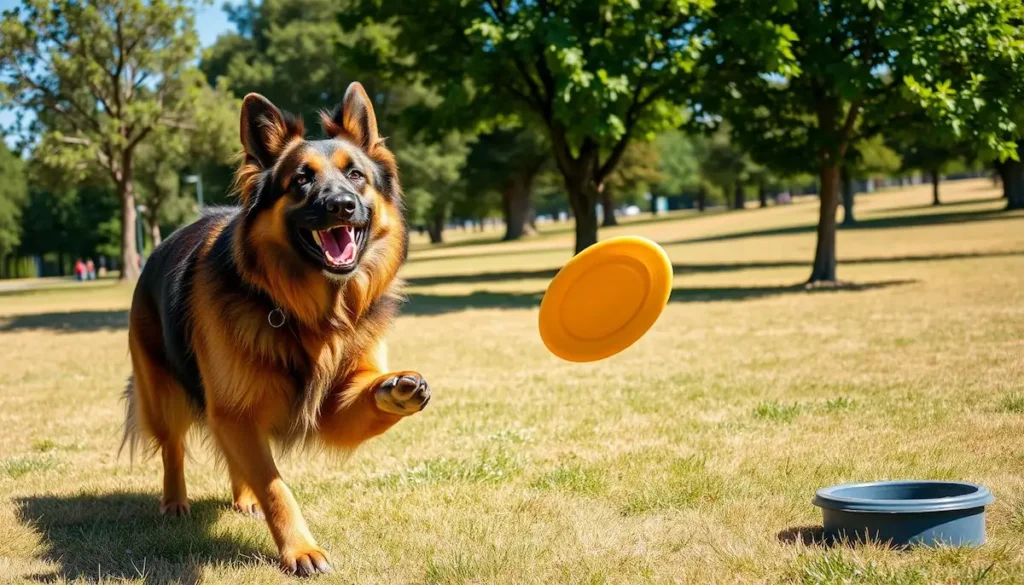
A King Shepherd playing fetch in a sunny park, surrounded by trees and open grass, showcasing a vibrant blue sky, with a happy expression, capturing the essence of an active dog exercise routine, alongside a frisbee and a water bowl nearby.
Training and Socialization
King Shepherds are very smart and love to please. They are easy to train. Start with basic commands like “sit,” “stay,” “come,” and “leave it” early on. Use rewards and praise to help them learn good habits.
Basic Obedience Training
Start training your King Shepherd puppy right away. Be patient and consistent. This will help them learn fast and become good friends.
Advanced Training Opportunities
King Shepherds are great at advanced training. They are smart and athletic. Try agility, tracking, and herding to keep them mentally and physically active.
Socialization Tips
- Introduce your King Shepherd to many people, animals, and places early. This makes them confident and well-adjusted.
- Good socialization prevents fear, anxiety, or aggression. It’s key for their well-being.
- Sign them up for puppy socialization classes. It’s a safe place for them to meet and learn.
Training and socialization are key for a happy, well-behaved King Shepherd. With the right training, you’ll have a lifelong friend.
Grooming and Maintenance
As a proud owner of a King Shepherd, you’ll need to be diligent with dog grooming tips. Their thick, double-layered coat needs regular care to avoid matting and excessive shedding management.
Brushing your King Shepherd 2-3 times a week is key to keeping their coat care in top shape. During shedding seasons, you might need to brush daily to handle the loose fur. Bathing should be done every few months or as needed to keep their skin and coat healthy.
- Brush your King Shepherd 2-3 times per week
- Increase brushing to daily during heavy shedding seasons
- Bathe your pup every few months or as needed
Regular nail trimming, ear cleaning, and teeth brushing are also important for the King Shepherd. Their coat can be black, tan, sable, or brown, and is straight or slightly wavy.
By keeping up with your King Shepherd’s grooming, you can keep their coat looking great. Proper dog grooming tips, shedding management, and coat care will keep your furry friend happy, healthy, and well-maintained.
Diet and Nutrition Guidelines
Keeping your King Shepherd’s diet balanced is key for their health. These dogs need a special diet to keep their energy up, muscles strong, and live long lives.
Feeding Schedule
Adult King Shepherds need 3-4 cups of top-notch dry dog food daily, split into two meals. Puppies and very active dogs might need more. Less active seniors might need less. Adjust their food based on their age, weight, and how active they are.
Nutritional Requirements
A balanced canine diet for King Shepherds should have quality proteins, complex carbs, and healthy fats. Aim for 18-22% protein from sources like chicken, beef, lamb, and fish. Fats like fish oil, flaxseed, and chicken fat are vital for energy and a shiny coat. Carbs from whole grains and veggies give lasting energy and fiber.
Food Selection Tips
- Choose dog foods with real meat first, and avoid artificial preservatives or fillers.
- Look for dog nutrition formulas made for large breeds like King Shepherds. They offer the right nutrient balance.
- Talk to your vet to find the best feeding large breeds plan for your King Shepherd’s unique needs.
Feeding your King Shepherd a nutrient-rich, balanced canine diet supports their health, energy, and long life. Tailoring their diet to their needs is crucial for their well-being.
Living with a King Shepherd
The King Shepherd is a great choice for families. They are loyal and gentle with kids. These dogs need lots of space and regular exercise.
King Shepherds love being around people and can get sad if left alone. They do well in homes with yards where they can run and play.
As family dogs, King Shepherds are amazing. They are very devoted to their families and are great with kids. But, they need proper care and socialization to fit in well.
If you want a loyal and smart dog-friendly home companion, consider a King Shepherd. They are big, energetic, and need owners who can give them lots of attention and training.
| Characteristic | Value |
|---|---|
| Height | 25 to 31 inches |
| Weight | 70 to 150 pounds |
| Lifespan | 10 to 12 years |
| Colors | White, silver, tan, brown, gray, and black |
King Shepherds are big, full of energy, and protective. They need owners who can give them lots of attention, exercise, and training. By understanding their needs, you can have a happy and fulfilling life together.
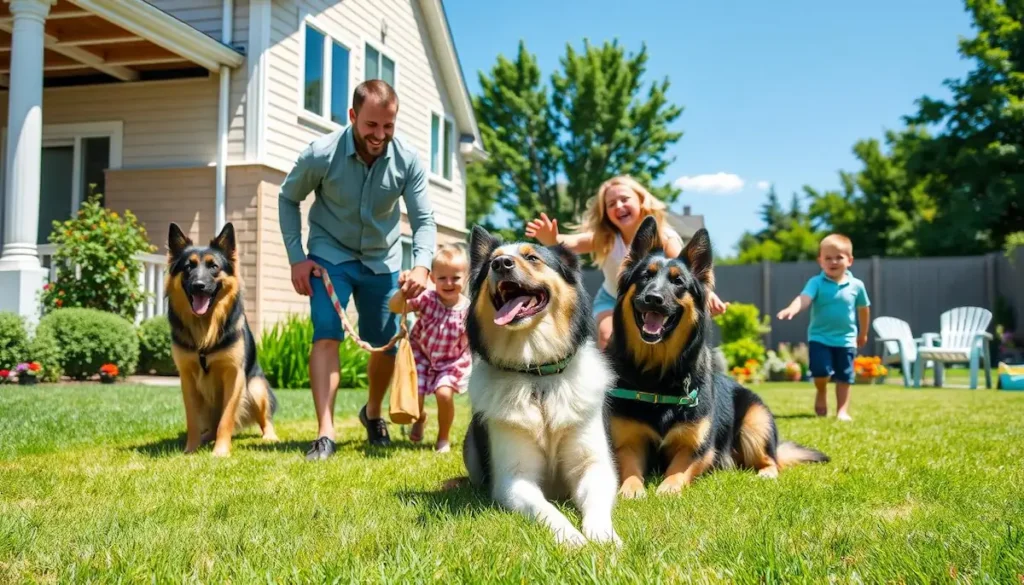
A joyful family scene in a sunny backyard, featuring King Shepherds playfully interacting with children; lush green grass, colorful flowers, and a blue sky in the background, showcasing the bond between the dogs and family members.
Conclusion
The King Shepherd is a majestic breed that needs dedicated care and commitment. They are big, loyal, and smart, making great companions for active families. But, owners must think about their exercise needs, grooming, and health before adopting.
King Shepherds might face health issues like hip and elbow dysplasia. But, with the right care and preventive steps, they can live long, healthy lives. It’s important to keep them active, feed them well, and take them to the vet regularly.
Before bringing a King Shepherd home, understand their unique traits and the duties of responsible dog ownership. With the right care and commitment, a King Shepherd can be a loving family member for years.
FAQ
What is the origin and development of the King Shepherd breed?
The King Shepherd is a large dog breed from the United States. It’s a mix of German Shepherd and other breeds like Alaskan Malamute, Great Pyrenees, and Akita. They were made in the 1990s to be a healthier version of the German Shepherd.
What are the physical characteristics and size of King Shepherds?
King Shepherds are tall, standing 25-31 inches, and heavy, weighing 70-150 pounds. Males are usually taller, 29-31 inches, and weigh 130-150 pounds. Females are 27-29 inches tall and weigh 90-110 pounds.
They have a thick double coat that can be straight or slightly wavy. They come in many colors like sable, black and tan, cream, silver, solid black, and solid white.
What is the breed recognition status of King Shepherds?
The King Shepherd is recognized by the American Rare Breed Association. But, major kennel clubs like the American Kennel Club (AKC) or United Kennel Club (UKC) do not recognize them.
What are the temperament and personality traits of King Shepherds?
King Shepherds are loyal, loving, and smart. They are easy to train and friendly. They are protective but not aggressive.
They are calm and patient when socialized well. They are also good with children.
What are the common health issues and life expectancy of King Shepherds?
King Shepherds can have hip and elbow dysplasia, bloat, and degenerative myelopathy. They might also get allergies and heart disease. With care, they live 10-14 years.
What are the exercise requirements and activity needs of King Shepherds?
King Shepherds need lots of energy and at least one hour of exercise daily. They love walks, runs, hikes, swimming, or fetch. They also need mental games and training.
Without enough exercise, they might have behavioral problems.
What are the training and socialization needs of King Shepherds?
King Shepherds are very smart and eager to please. They learn quickly with positive training. Start with basic commands like sit, stay, come, and leave it early.
They do well in advanced training like agility, tracking, and herding. Early socialization is key for them to grow up well-rounded.
What are the grooming and maintenance requirements for King Shepherds?
King Shepherds have a thick double coat that needs regular grooming. Brush them 2-3 times a week, more during shedding seasons. Bathe them every few months or as needed.
Don’t forget to trim their nails, clean their ears, and brush their teeth regularly.
What are the dietary and nutritional requirements for King Shepherds?
King Shepherds need a diet rich in protein, balanced carbs, and healthy fats. Adult dogs need 3-4 cups of dry food daily, split into two meals. Puppies and active adults might need more.
Choose dog foods with real meat first and avoid artificial preservatives or fillers.
How suitable are King Shepherds as family dogs?
King Shepherds are great family dogs, known for their loyalty and gentleness with kids. They need lots of space and exercise. They love being around people and can get anxious if left alone too long.
They can adapt to different homes but prefer ones with yards.

